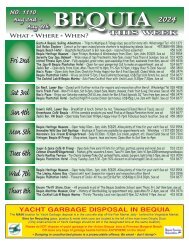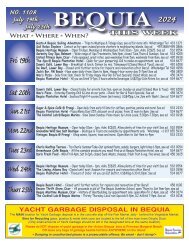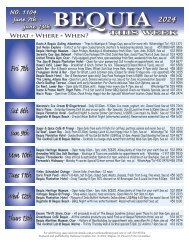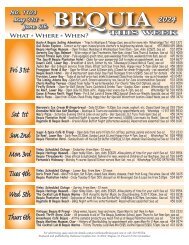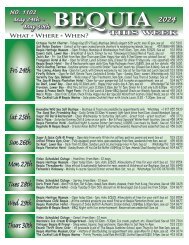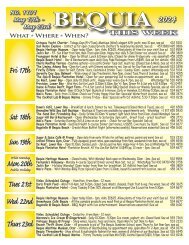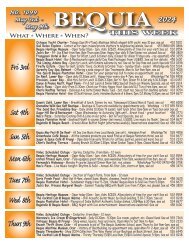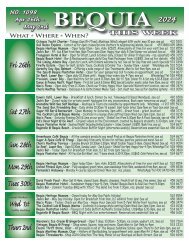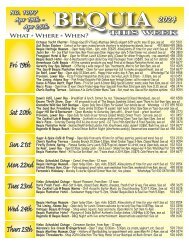Caribbean Compass Yachting Magazine - December 2020
Welcome to Caribbean Compass, the most widely-read boating publication in the Caribbean! THE MOST NEWS YOU CAN USE - feature articles on cruising destinations, regattas, environment, events...
Welcome to Caribbean Compass, the most widely-read boating publication in the Caribbean! THE MOST NEWS YOU CAN USE - feature articles on cruising destinations, regattas, environment, events...
You also want an ePaper? Increase the reach of your titles
YUMPU automatically turns print PDFs into web optimized ePapers that Google loves.
<strong>Caribbean</strong><br />
Christmases<br />
of Old<br />
by Arlene Walrond<br />
While I have enjoyed Christmas experiences in other places, they do not<br />
compare with Christmas in my homeland, Trinidad. As a local song says, “Trini<br />
Christmas is the best!”<br />
People came from all over for a taste<br />
of my grandmother’s Christmas wine<br />
Some say that the season is too commercialized, and I believe that’s true, but<br />
the love is still there. A lot of Hindus and even some Muslims celebrate<br />
Christmas in Trinidad, at least as far as gift giving and decorating goes. Of<br />
course some people go overboard with decorations. Once I saw an entire house<br />
covered in lights from roof to foundation. I don’t know how the occupants got<br />
in and out without tripping on the wires or crushing some bulbs. In some<br />
areas you’d swear you were in America for all the plastic snowmen on the<br />
lawns and reindeer on the roof.<br />
For me nothing can beat the <strong>Caribbean</strong> Christmases of old. I remember my<br />
father buying our ham wrapped in pitch, weeks before Christmas. This would<br />
hang from a rafter in our kitchen (which was a separate building from our<br />
house) until Christmas Eve, when it would be boiled. And while the ham was<br />
boiling the bread and cakes and pone would be in the brick oven. Ginger beer<br />
and sorrel would be prepared. My grandmother made a mean rice wine in a large<br />
earthenware jar. The wine was strained and decanted into smaller glass jars on<br />
Christmas Eve. After the wine was strained, the residue in the jar — rice, raisins<br />
and pieces of oranges — were thrown in the yard, and the fowls would eat it and<br />
get drunk and stagger all over the place: a big joke for us kids at the time. People<br />
came from all over for a taste of my grandmother’s Christmas wine, even two<br />
Muslim brothers, Hamroon and Kamroon.<br />
The week before Christmas, it fell on us kids to scrape and sand the furniture<br />
in preparation for new varnish. Everything had to be spick and span — new<br />
wallpaper, new curtains, new sheets on the beds, new pajamas. And being good<br />
Catholics, everything had to be in order before we left home for midnight mass<br />
on Christmas Eve night.<br />
Christmas Day was probably the only time we children ever got out of bed<br />
early without any prompting. Our presents would be in a pillowcase beneath our<br />
homemade tree with its homemade decorations. My mother was good at that.<br />
With some angel hair and coloured crêpe paper and a branch from a guava tree,<br />
together with some of our teeny pre-Christmas toys, she made magic happen.<br />
Another facet of the old days that I liked was door-to-door carolling; I really<br />
miss that. In some villages, where remnants of the culture of our Spanish<br />
Parang groups<br />
would go from<br />
house to house<br />
serenading the<br />
inhabitants.<br />
colonisers were still alive, parang groups would go from house to house<br />
serenading the inhabitants, some of whom would invite them in to partake of<br />
the holiday fare. I had the pleasure of experiencing that once when I spent the<br />
holidays at an uncle’s house.<br />
Most people stayed home on Christmas Day, but from Boxing Day until New<br />
Year’s Day (and sometimes beyond), friends and neighbours would visit one<br />
another, and relatives from far away would make their annual visit and stay a few<br />
days.<br />
And when it was all over, the ham bone would be used to flavour a pot of pelau<br />
or soup, then the good dishes would be returned to the cabinet until the next<br />
year when the whole ritual would start all over again.<br />
We’re celebrating <strong>Caribbean</strong> <strong>Compass</strong>’s 25th Anniversary Silver Jubilee Year<br />
by sharing favorite articles from past issues. A version of this article appeared in<br />
<strong>December</strong> 2005.<br />
MYMARIOS.COM<br />
DECEMBER <strong>2020</strong> CARIBBEAN COMPASS PAGE 23




